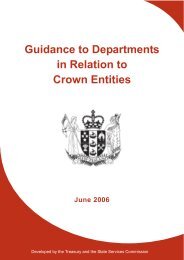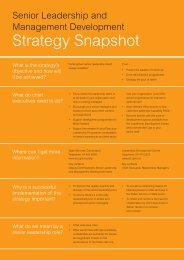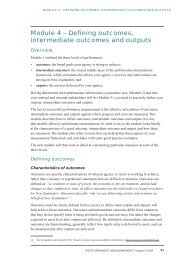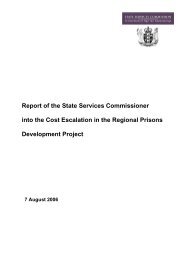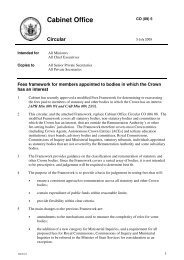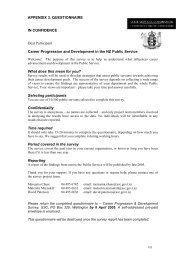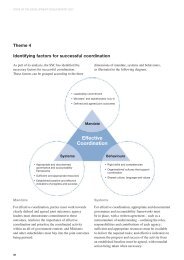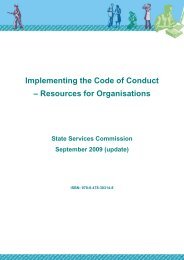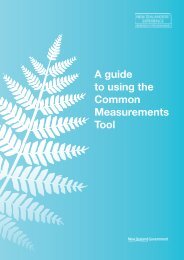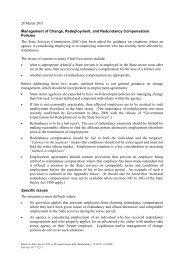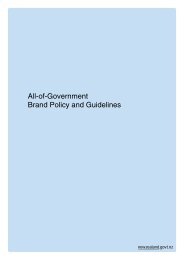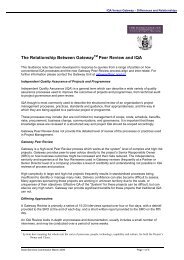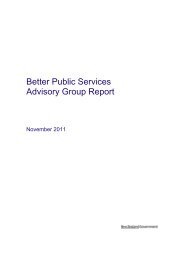Blank Doc with SSC Logo and RDMS Doc Number - State Services ...
Blank Doc with SSC Logo and RDMS Doc Number - State Services ...
Blank Doc with SSC Logo and RDMS Doc Number - State Services ...
Create successful ePaper yourself
Turn your PDF publications into a flip-book with our unique Google optimized e-Paper software.
discussion under TOR 1.6). NCEA provides for external <strong>and</strong> internal assessment at three<br />
levels, as well as the externally assessed Scholarship at Level 4 (in 2004). In total this<br />
amounts to more than 150,000 c<strong>and</strong>idates <strong>and</strong> approximately 1.9 million individual<br />
examination booklets, a massive undertaking. In short, the implementation of NCEA<br />
required a major, complex change management process. This included three years of<br />
professional learning <strong>and</strong> development managed by the Ministry, the instituting of<br />
significant new business processes by NZQA, <strong>and</strong> extensive relationship management<br />
<strong>with</strong> schools by NZQA.<br />
13 Furthermore, the implementation of NCEA <strong>and</strong> Scholarship, commencing in 2002, has<br />
been undertaken over a very short timeframe, necessary in order to provide a coherent<br />
pathway for students through senior secondary school. The implementation of Level 1<br />
NCEA was particularly difficult, <strong>with</strong> a major industrial dispute <strong>with</strong> secondary school<br />
teachers complicating communication <strong>and</strong> discussion on Level 1 implementation in the<br />
early months of 2002. In contrast, the implementation of Level 2 NCEA was relatively<br />
smooth, although there were some technical difficulties <strong>with</strong> the posting of results on the<br />
NZQA website.<br />
14 When it came to implementing Level 3 NCEA <strong>and</strong> the 2004 Scholarship in the same<br />
year, there was insufficient appreciation of the need to differentiate between the two<br />
assessments. In the event, implementation of Level 3 NCEA, which has a much wider<br />
impact on students than Scholarship, was the main focus of attention, <strong>with</strong> Scholarship<br />
essentially being implemented in its slipstream. The strategic risks, both policy <strong>and</strong><br />
implementation, associated <strong>with</strong> Scholarship received insufficient attention.<br />
15 It is important to appreciate that the implementation of NCEA is in its early stages <strong>and</strong><br />
will continue to evolve. The magnitude of the change is such that the transition to better<br />
learning, teaching <strong>and</strong> assessment will continue over at least the next five years. The<br />
focus of attention <strong>and</strong> debate should not merely be on approaches to assessment. The<br />
Review Team notes that to this point the change has been implemented reasonably well<br />
overall.<br />
Overview of Findings<br />
16 The overall finding is that the difficulties experienced <strong>with</strong> the 2004 Scholarship resulted<br />
from inadequacies in both policy advice <strong>and</strong> implementation.<br />
17 The Government received inadequate advice on the policy risks associated <strong>with</strong> the 2004<br />
Scholarship. The principles on which Scholarship was to be based were established in<br />
1998, <strong>with</strong> the more detailed aspects of policy being developed through consultation <strong>with</strong><br />
key stakeholders over the succeeding five years. This was a long process during which<br />
officials failed to adequately take stock of the policy settings <strong>and</strong> provide the government<br />
<strong>with</strong> an explicit analysis of the implications for the outcome of the 2004 Scholarship. A<br />
stocktake <strong>and</strong> analysis might well have led to a further refinement in the policy settings<br />
for the 2004 Scholarship, along the lines of those recently approved by the government.<br />
Instead, there was a ‘drift’ into implementation <strong>with</strong>out an adequate analysis of the<br />
strategic policy risks.<br />
18 The result was that the expectations of Ministers were not aligned <strong>with</strong> those of officials<br />
in the Ministry of Education <strong>and</strong> NZQA, <strong>and</strong> the outcome of the 2004 Scholarships came<br />
as a surprise to both Ministers <strong>and</strong> the wider public. For example, officials saw the<br />
variability of results between subjects as a consequence of the approach to Scholarship,<br />
rather than as a significant risk that could undermine the credibility of the examinations.<br />
3



